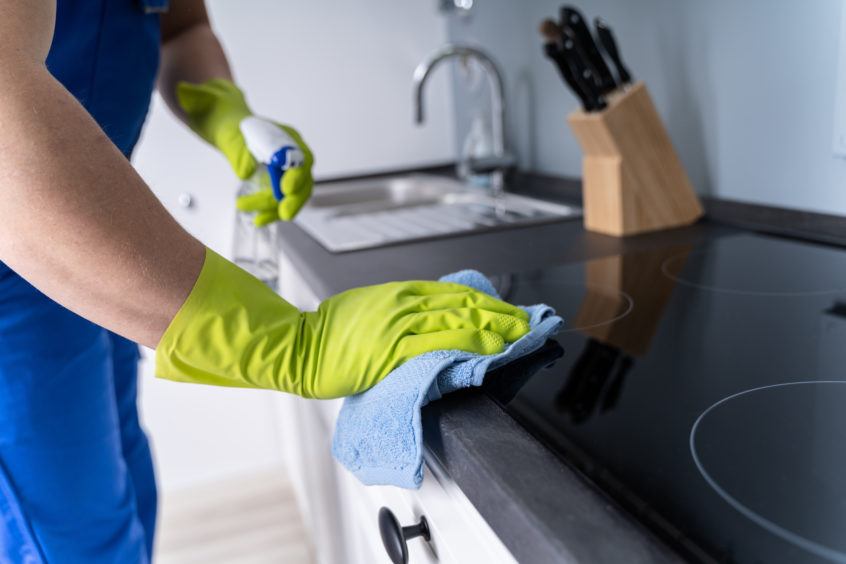The kitchen is one of the most memorable areas of the home where mother prepares tasty meals, has a lot of conversations, and you spend almost half of your day in the kitchen. However, this is the most favorite place of germs & bacteria, if not cleaned properly. Well!! Maintaining a clean kitchen is not just important to make a house look good, but it’s crucial for maintaining the health of the family. You will get a lot of benefits and protect your family from harmful diseases. The Best Bond Cleaning Perth team share some tips to highlight the benefits of kitchen cleaning and how you can maintain a proper cleanliness inside the kitchen. Let’s get started!
Preventing Foodborne Illnesses
Keeping your kitchen clean is essential if you want to avoid contracting foodborne illnesses. Cutting boards, countertops, and other kitchen surfaces are breeding grounds for bacteria like Salmonella, E. Coli, and Listeria if they are not routinely cleaned. These organisms have the potential to cause severe food poisoning, which can result in symptoms like nausea, vomiting, and diarrhea as well as more serious health issues in susceptible groups like young children, the elderly, and people with weakened immune systems.
Proper Kitchen Hygiene
All surfaces that come into touch with food must be cleaned on a regular basis as part of proper kitchen hygiene. This entails cleaning cutting boards with hot, soapy water on a regular basis, disinfecting counters, and making sure that tools are clean before use. To avoid cross-contamination, it’s also critical to wipe up spills as soon as possible, particularly ones involving raw meat, poultry, or eggs.
Reduce the Spread of Bacterias
Limiting the spread of Dangerous Bacteria Particularly if food is not handled or kept properly, kitchens can serve as a breeding ground for bacteria. For instance, bacteria found in raw meat may spread to other foods through cross-contamination and result in disease. If the same chopping board or knife is used for both raw and cooked food without being properly cleaned in between, this can happen. It’s critical to implement good cooking habits in order to minimize the spread of hazardous microorganisms. For raw meat and other items, use different cutting boards; wash your hands frequently with soap and water; and sanitize surfaces and utensils after each use. Furthermore, make sure food is kept at the optimum temperature because incorrect storage might encourage the growth of bacteria.
Avoiding Allergies and Sensitivities
Additionally, keeping the kitchen clean helps avoid sensitivities and allergic reactions. Even minute amounts of allergen residue can cause an allergic response in people who have dietary allergies. Frequent cleaning can assist in getting rid of allergy residue from appliances, utensils, and surfaces. This is especially crucial in homes with many individuals who could have various dietary requirements or restrictions.
The chance of unintentional allergy exposure can be reduced by making sure that surfaces used for food preparation are completely cleansed and that utensils are properly cleaned after each use. This entails being especially watchful of details that are easily missed, like the interiors of microwaves, refrigerator handles, and cabinet doors.
Preventing Pests
Cockroaches, rodents, and ants are among the pests that can be drawn to unclean kitchens. These bugs can contaminate food and spread disease in addition to being an annoyance. Because food residue, crumbs, and spills attract pests, maintaining a clean kitchen is essential to avoiding infestations.
Pests can be discouraged by routinely emptying the garbage, cleaning up spills right away, and making sure food is kept in sealed containers. Furthermore, eliminating possible food sources for pests can be achieved by routinely cleaning behind appliances and keeping floors and countertops clear ofcrumbs. Make sure to clean wooden kitchen cabinets, as wood is the most favorite areas of pests.
Promoting Mental Well-Being
Mental health benefits can also be derived from a well-kept and ordered kitchen. A neat and organized space can encourage a sense of peace and order, whereas clutter and mess can be overpowering and distressing. This may increase the enjoyment of cooking and kitchen time, which may promote healthy eating practices. A clean atmosphere can be maintained with less work if a kitchen cleaning program is established. Deeper cleaning jobs can be more easily handled by preventing problems from building up and by performing basic everyday duties like sweeping the floor, washing dishes, and wiping off countertops.
Tips for Maintaining a Clean Kitchen
- Create a Cleaning Routine: Make a schedule for your weekly, monthly, and daily cleaning chores. Weekly chores could be mopping the floor and cleaning the appliances, while daily activities might be cleaning the dishes, wiping down surfaces, and bringing out the garbage.
- Use the Right Cleaning Products: Select safe and efficient cleaning supplies for use in the kitchen. Seek out disinfectants that are capable of eliminating bacteria and viruses. For a more environmentally friendly method, think about using natural cleaning solutions like baking soda and vinegar.
- Stay Organized: To make cleaning your kitchen easier, keep everything orderly. Arrange things in their proper locations, and tidy up frequently to prevent the buildup of extraneous stuff.
- Clean as You Go: Make it a habit to clean while you prepare food. To avoid creating a big mess, wipe down surfaces, wash utensils, and store ingredients as you use them.
- Focus on High-Touch Areas: High-end areas, such as light switches, cabinet knobs, and refrigerator handles, should receive extra care because they may be home to bacteria and viruses.
Conclusion
To keep yourself healthy, you must keep your kitchen clean. It helps stop the spread of dangerous bacteria, helps prevent allergies and sensitivities, stops bug infestations, helps prevent foodborne illnesses, and improves mental health. Your kitchen can be a safe and healthy place for you and your family to be by implementing proper cooking practices and creating a regular cleaning schedule. Keep in mind that keeping your kitchen tidy is an investment in your health and well-being rather than just a burden.


